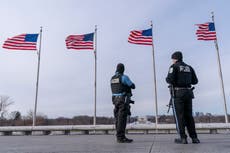Widow of Capitol Police officer who died by suicide slams lack of support
‘If Howie had had a heart attack, we probably wouldn’t be fighting to get his death recognized and properly memorialized,’ writes Dr Serena Liebengood
The widow of a Capitol Police officer who died by suicide after the 6 January insurrection has blasted Washington’s bureaucracies for not doing more to honour her husband.
Officer Howard “Howie” Liebengood was on duty on 6 January, 2021, when a mob of Donald Trump supporters stormed the US Capitol. According to his grieving wife, Dr Serena McClam Liebengood, Mr Liebengood continued to work round-the-clock shifts on 7, 8, and 9 January with little sleep in between.
“Sleep-deprived and exhausted, my husband took his life the night of Jan 9,” Dr Liebengood, a radiologist at Johns Hopkins Medicine, wrote in a column for USA Today. “If it had not been for the events of Jan 6 and the unremitting work schedule on the ensuing days, I believe my husband would still be here.”
According to The New York Times, at least seven people died in connection to the Capitol riot. Two of them were police officers who died by suicide: Officer Jeffrey Smith of the Metropolitan Police Department, and Mr Liebengood.
And yet despite the connection between the insurrection and her husband’s death, Dr Liebengood says, bureaucrats have refused to honour his passing with an “in the line of duty” designation.
To the family of a fallen officer, those words matter a great deal. With an “in the line of duty” designation, a deceased officer can be memorialised on a list of the fallen, lie in state in the Capitol, and bequeath government benefits to his or her family. Without the designation, none of that happens.
“If a law enforcement officer commits suicide, even if it was in the context of a critical incident and its aftermath like Jan 6, they are not eligible for a line-of-duty designation,” Dr Liebengood writes. “Put simply, the designation process reinforces stigma and fails to acknowledge the impact of work-related stressors on mental health.”
Mr Liebengood served in the Capitol Police for 15 years, and was involved in fending off the worst attack on the Capitol in modern history. And yet just because his death was related to a mental health crisis and not a physical one, his widow says, his family has been denied benefits.
“If Howie had had a heart attack, we probably wouldn’t be fighting to get his death recognized and properly memorialized,” she writes.
To fix this, Dr Liebengood recommends a review of the “line of duty” designation criteria – not just for her own family’s sake, but for all “officers and families affected by suicide.”
“I’m still picking up the pieces of my broken heart,” she writes, “but I’m also determined to bring positive change to the institutions that failed my Howie – not just because it’s the right thing to do, but because it’s what Howie would have wanted.”
Join our commenting forum
Join thought-provoking conversations, follow other Independent readers and see their replies
Comments




Bookmark popover
Removed from bookmarks